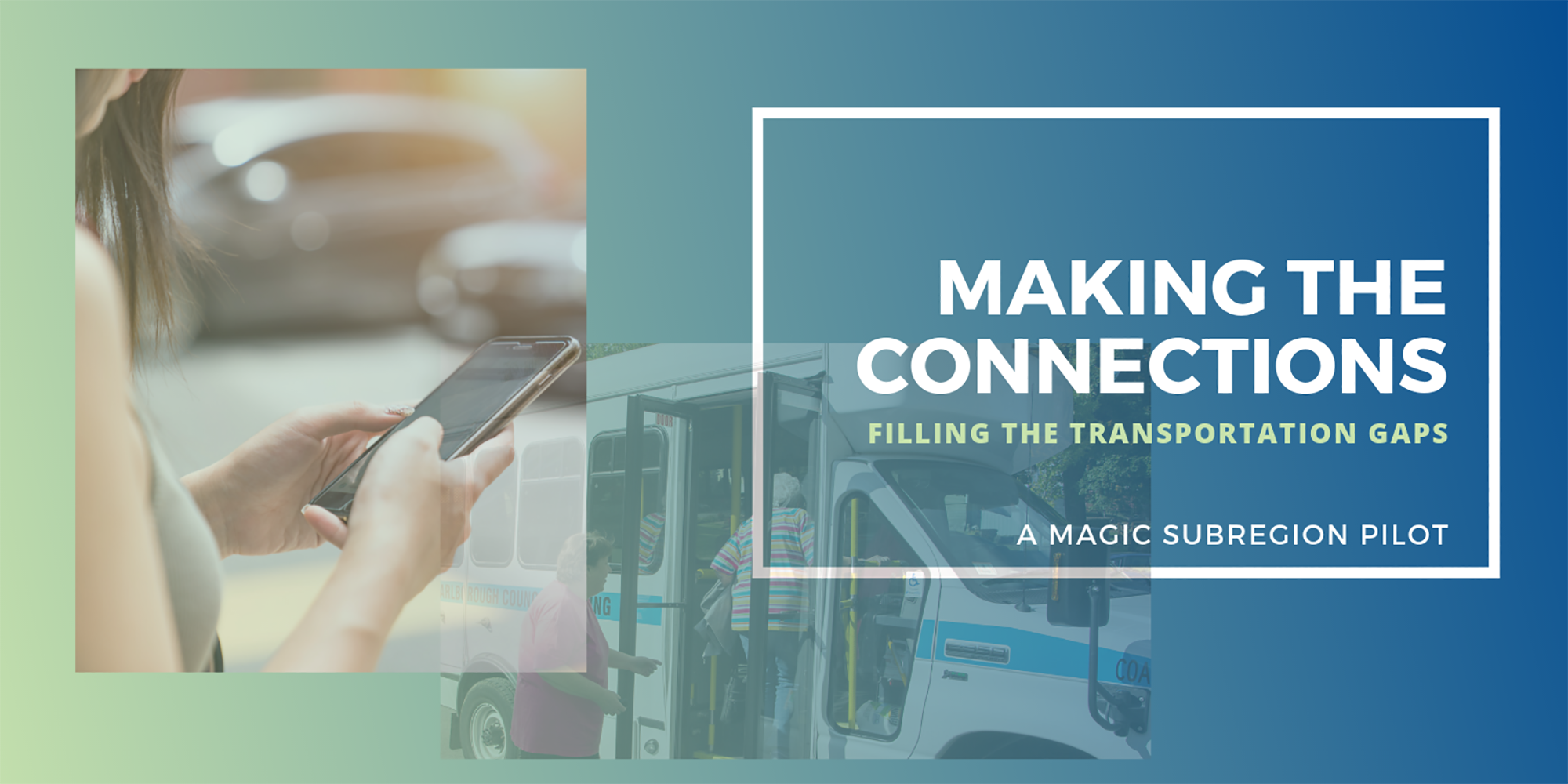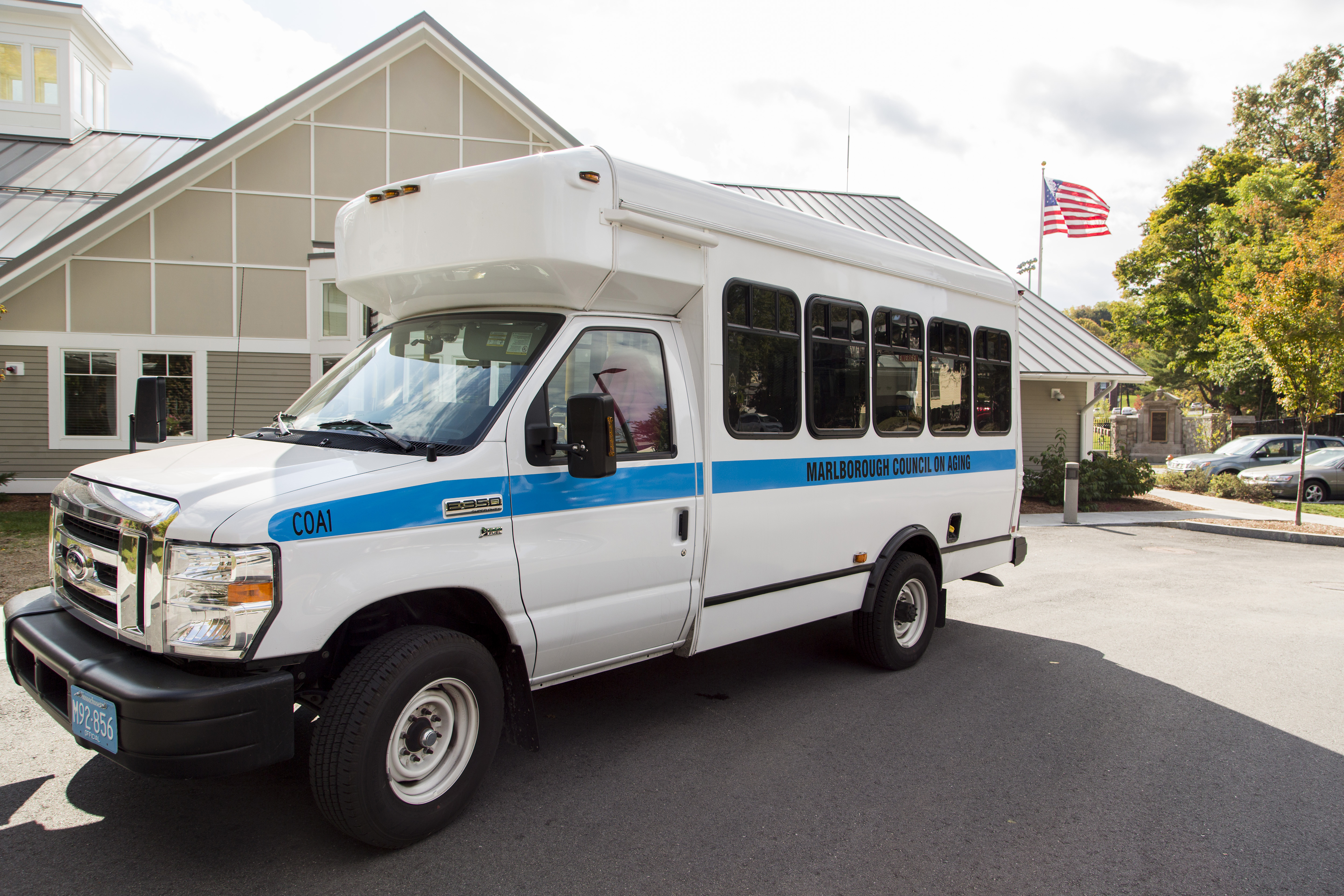

Communities in the MAGIC Subregion have joined together to develop on-demand transportation pilots to help fill the gaps in the region’s transit network. The program, called Making the Connections, focuses on connecting seniors, people with disabilities, financially vulnerable residents, and veterans to health services, community resources, and economic opportunities with on-demand transportation services.
While many communities offer some variety of on-demand paratransit and some offer general public vans or commuter shuttles, there are times when these services do not cover all transportation needs. It is these unmet needs that Making the Connections will attempt to meet through pilot services.
Data from community pilots will be used to:
Explore the future applicability of shared microtransit platforms to optimize transit programs and regional cooperation in the larger MAGIC subregion, and
Ensure the sustainability and continuous improvement of regional transportation in the MAGIC subregion, particularly for our most needy residents.
This program is being led by the Town of Sudbury and is funded in part by a Community Compact Cabinet Best Practices grant awarded to the Town of Sudbury. MAPC is providing technical assistance.
Frequently asked questions on Making the Connections can be found below. If your Town is interested in creating a pilot, please contact Travis Pollack at MAPC at [email protected].
What Making the Connections is Offering:
- Funds immediately available to support small, subsidized, transportation pilots across MAGIC -- go it alone (e.g., weekend transportation to faith communities) or go it together (e.g., several towns share WAV pilot).
- Oversight across MAGIC, to ensure consistency of data collection (minimum data set), continuous quality improvement methodology, and rapid dissemination of pitfalls to avoid and practices to implement.
- Funds for marketing and outreach of new services.




Updates and Past Events
The Steering Committee of participating municipalities meets regularly. Meetings are typically held at the Town of Sudbury and via WebEx. Please contact Travis Pollack at [email protected] if you would like to participate or would like more information.
October 28, 2019
On October 28, the Making the Connections steering committee reviewed the draft intermunicipal agreement and discussed the steps needed to start a transportation pilot.
Download the Oct. 28 event summary
Includes:
- Updates to draft intermunicipal agreement
- Program manager position update
- How to start a pilot (one-pager included in summary above)
October 10, 2019
On October 10, the Town of Sudbury hosted an information session on Making the Connections where participants reviewed the draft intermunicipal agreement and the draft Program Manager scope of services.
September 26, 2019
On September 26, MAPC hosted an online information session to inform interested participants, determine the framework for municipalities to join the program, and lay out next steps.
September 9, 2019
On September 9, 2019, the Town of Sudbury hosted a second information session on Making the Connections.
July 23, 2019
On July 23, 2019, the Town of Sudbury hosted an information session on Making the Connections. You can watch a recording of the event here.
April 4, 2019
Travis Pollack and others provided an update to MAGIC on the microtransit Request for Information (RFI) and the next steps communities could pursue to develop microtransit and other on-demand transit options.
FAQs
Gaps in transportation present significant barriers to seniors and especially to the most vulnerable (including seniors) in our communities, who experience limited access to food pantries and grocery stores; to employment opportunities; to medical services; and to social opportunities. The pilot program intends to address these urgent needs.
Last updated August 19, 2019
Questions About the Pilot
What MAGIC towns are involved?
Towns listed in the CCC proposal are Acton, Bolton, Boxborough, Carlisle, Stow, and Sudbury as lead. These towns have sparsely populated areas with identified transportation gaps, but all MAGIC towns are welcome!
What approaches will be used to fill transportation gaps?
The grant provides a large umbrella for many approaches. There is no “one size fits all” involved or intended. Ideas for pilots include partnerships with taxi companies, ride-hailing (Uber, Lyft), and possibly microtransit (dynamic, on-demand public transportation). Each municipality is free to experiment with what works best for their town. Carlisle (for example) has already committed to a pilot (outside of this program) with a ride-hailing firm.
If each town is free to experiment, what is the objective of the pilot?
The objective of the pilot is for participating towns to collect consistent data on ride numbers, destinations, points of origin, time, etc., which can be automated by software or (in certain cases) manually accomplished. Where the transportation services provided will vary, the data collection technology will be common to all pilot participants.
Why consistent data?
Data from this pilot will be used to
- Explore the future applicability of shared microtransit platforms and:
- Inform improvements to regional transportation, particularly for residents with the greatest needs.
What residents will be served?
The grant is targeted to seniors, people with disabilities, financially vulnerable residents, and veterans, with the objective of providing transportation connections to health care, community resources, and economic opportunities. We anticipate that if there is more than one pilot, municipalities could tailor the pilot to meet the needs of their residents.
Will the pilot take trips away from existing transit services?
A key component of the program is to make sure that the pilots provide new services that fill in gaps, and do not compete with existing transportation options.
How is the pilot being coordinated or managed?
- The pilot includes funding for a part-time, contract Program Manager, who will be responsible for managing and coordinating the program tasks and sub-tasks.
- A key role of the Program Manager is program communication, to ensure clarity of understanding and cohesion of efforts.
- In addition to the contract Program Manager, the grant also provides money for marketing and outreach staff for your town. To ensure effectiveness of your pilot, communication, advocacy, and customer support are vital.
- MAPC will provide technical assistance on the project, and work in coordination with the Program Manager.
Questions About Involvement
You say all MAGIC towns are welcome to participate. What are the ways my town can participate?
Join the Steering Committee: A representative from your town can join the Steering Committee. The Steering Committee will help in the overall guidance of the program and to provide input to issues and questions that may arise. Joining the Steering Committee as a non-voting member does not commit a municipality to participate in a pilot.
Join the Pilot: Please join the Pilot! Participation in the pilot will enhance your ability to extend subsidized on-demand services to eligible residents in your town. We ask that towns participating in the pilot have a town representative on the Steering Committee. During this pilot, small grants will be allocated to communities for pilot subsidies. The Program Manager and the Steering Committee will regularly evaluate data and recommend changes as needed and help each town to work towards a financially sustainable service beyond this grant funding. Funding sources towns can leverage may include donations, mitigation funds, Community Health Needs Assessment funds, etc.
If I join the Steering Committee, what is the time commitment?
As often as possible, Steering Committee meetings will be held in locations with audio-video resources, so that you can participate remotely or view the meeting at a later time and respond when needed. We are very aware of people’s time availability and will use technology to reduce your time commitment to a fixed location/time.
